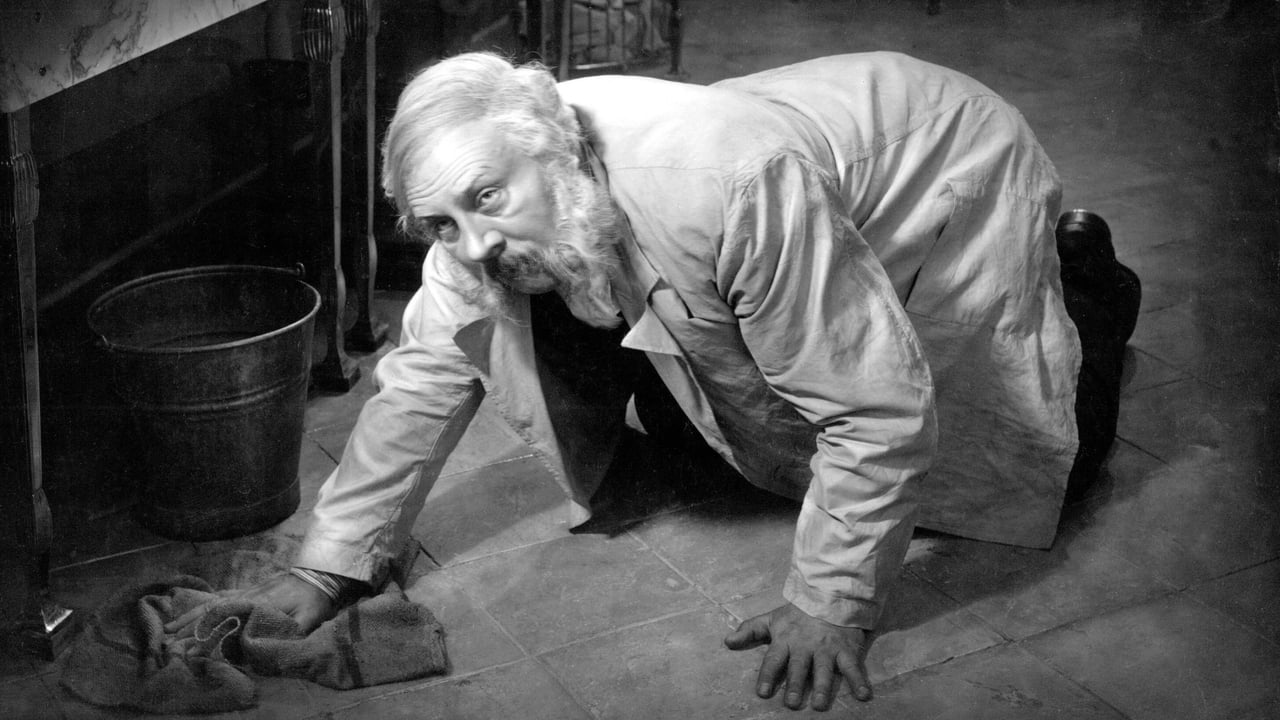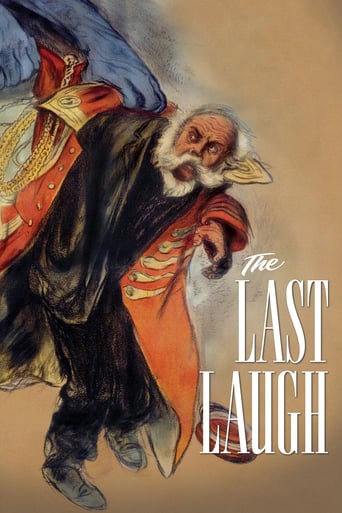

Switching from expressionism to kammerspiel was only for the best for F.W. Murnau. Turning from pure fiction to reality, the director and his cinematographer Freund introduced, quite revolutionarily, moving camera (and also POV-shots) and abandoned intertitles. Intertitles do often kill film's dynamics, and "Noseratu," which is apparently the most famous Murnau's title, was in a way spoiled by texts of all kinds. To abandon intertitles completely was an obvious decision, but difficult to realize and demanding a great skill. Murnau did a brilliant job: there isn't a sequence or a shot which is hard to get despite no lines heard or seen and no explanation given.Admirably, even from external difficulties Murnau managed to benefit. I mean the ending forced by the movie producers. Murnau had to obey; but he made an obviously unrealistic farce instead of regular happy ending, and also preceded it with a sardonic commentary. As a result, the final sequence underlines picture's message: the second change of protagonist (now to a tux and a top hat) is not a random detail. Furthermore, it's not Hollywood-like idealism we feel here, but a hysterics, some desperate hope. We can even suppose that everything after the only intertitle with Murnau's commentary is a dream, protagonist's insane fantasy.Funny enough, this forced ending not only gave an additional dimension to "Der Letzte Mann," but also would be used as a narrative technique on its own right by other filmmakers: see Scorsese's "Taxi Driver" and Kusturica's "Underground," both featuring corresponding unrealistic epilogues.
... View MoreThe film is among the finest achievements of the silent cinema. The old doorman (Emil Jannings) of a luxury hotel is demoted to the job of lavatory attendant, but comes into a fortune and gets his revenge.The Last Laugh is an ironic silent anecdote, made important by its virtual abandonment of dialogue and the whole-hearted adoption of a freewheeling camera technique which gives some thrilling dramatic effects. The film is the most famous example of the short-lived Kammerspiel or "chamber-drama" genre. The set was built entirely within a studio, unusual for director F.W. Murnau, who preferred to shoot on location.
... View MoreEmil Jannings, who played Mephisto to the proverbial hilt in Murnau's FAUST, scores yet again as Herr Doormann in THE LAST LAUGH. He manages to convey a sincere, touching dignity that his ultimate fall from grace makes all the more poignant. (At one point, seeing a little girl being bullied by other Dead End kids, he sends them on their way and graciously gives her a small bag of candy. No sooner has he exited the shot than the Dead Enders are back, descending on her with her little bag of goodies like a pack of vultures. It's this kind of small, sensitive touch throughout that helps make his final fate all the more telling.) But that's not all: Murnau's mobile movie-making technique was light years ahead of what anyone else was doing at the time, and it's this improvised improvement that helps make THE LAST LAUGH one of the greatest silents ever lensed. With that single stroke of brilliance, THE LAST LAUGH advances the art of cinematography. (Much has been made of hand-held rigs with gyroscopic mounts, but one need only see THE LAST LAUGH to realize that there's more than one way to skin a cat.) The one glaring fault is, of course, the deus ex machina- the epilogue that Murnau was instructed to tack on to the end (which I didn't know- but had suspected- until I read about it here on the IMDb). More than "improbable," it's downright stupid, and singlehandedly undercuts everything that has come before it (in terms of story). Even so, THE LAST LAUGH is still must-see film-making for anyone who takes film-making seriously. It's absolutely brilliant.
... View MoreFrom the very first shots of this movie, my friend and I were just in awe of the way Murnau uses the camera to set up his situation. There's an intimacy to it, he brings us close to the characters. Also the way he uses the angles and straight lines of the windows, doors and buildings to frame his shots impresses us immediately with the dehumanizing nature of the city much as it did in his Oscar Winning American film "Sunrise: A Song of Two Humans." As if the impressive direction and photography weren't enough to distinguish this as one of the most impressive films I've seen from the early 20s, the whole affair is anchored by a brilliant performance from Emil Jannings. He plays a man who is retired from his position as a hotel doorman and demoted to the washroom, which leads to a sort of nervous breakdown imaginatively filmed and a fetishistic attachment to the uniform of his former office.This isn't a plot heavy film or a drama heavy film, basically it's a character study. It's remarkable for the fact that there are no dialog title cards, and only 2 or 3 informational title cards relating to various events and anchored to specific informational devices interior to the film (e.g. we see the boss' letter telling him of his demotion). The quality of the acting not only from Jannings but from the entire cast (perhaps with the exception of a broadly played gossip woman) we see very natural performances that you often don't in silent films.Of the 3 films I've seen by Murnau, this film impressed me the most. It doesn't have the melodramatic elements that make "Sunrise" a bit more predictable, and it doesn't have the languid pace that slows "Nosferatu" for me. It reminds me in some ways of the films I've seen from the 30s by Jean Renoir -- there's this fantastic way that the camera follow the actors around on the streets, pulling ahead of them momentarily and then allowing the main actor to zip through the frame while it focuses on incidental details. I'm thinking specifically of the scene where Jannings escapes after stealing back the uniform, but there are several scenes along these lines.Essentially I saw this film as a message of hope, interestingly couched with an explanation from the film-makers that "in reality" it would not have ended happily. It's too easy to see this card, one of as I said only 2 or 3 in the entire film and the only one that's not tied to a specific device, as Murnau's way of eating his cake and having it too. Is there a touch of the ending from this movie, with the two former bums riding off together, that comes to mind when you see Wilder's "Some Like It Hot"? Or has this been filtered by way of Mssrs. Lubitsch and Renoir et al? Either way I would describe the movie overall as purely cinematic, miles and miles beyond normal film-making techniques and taste of the early 20s and even arguably of today.
... View More